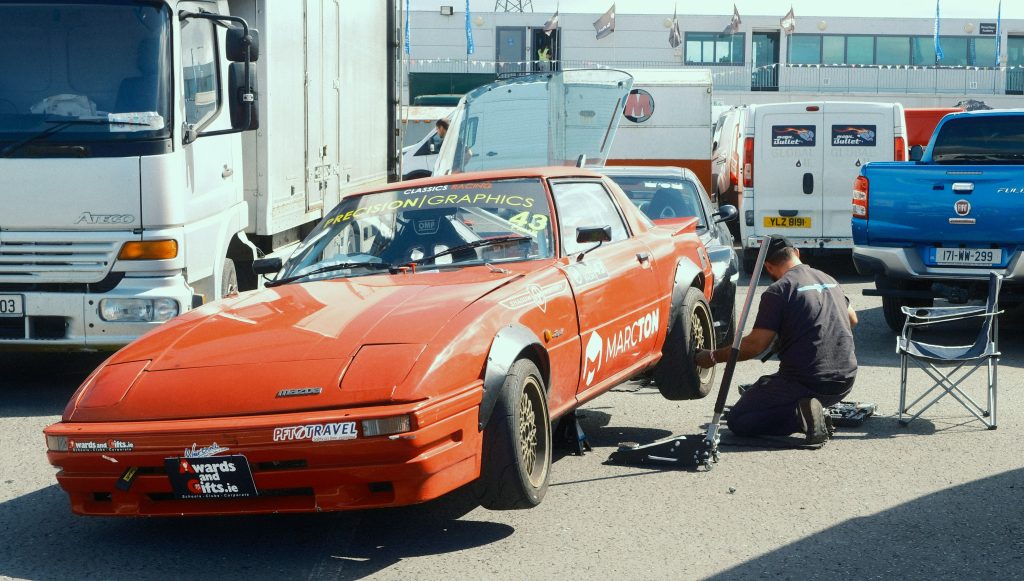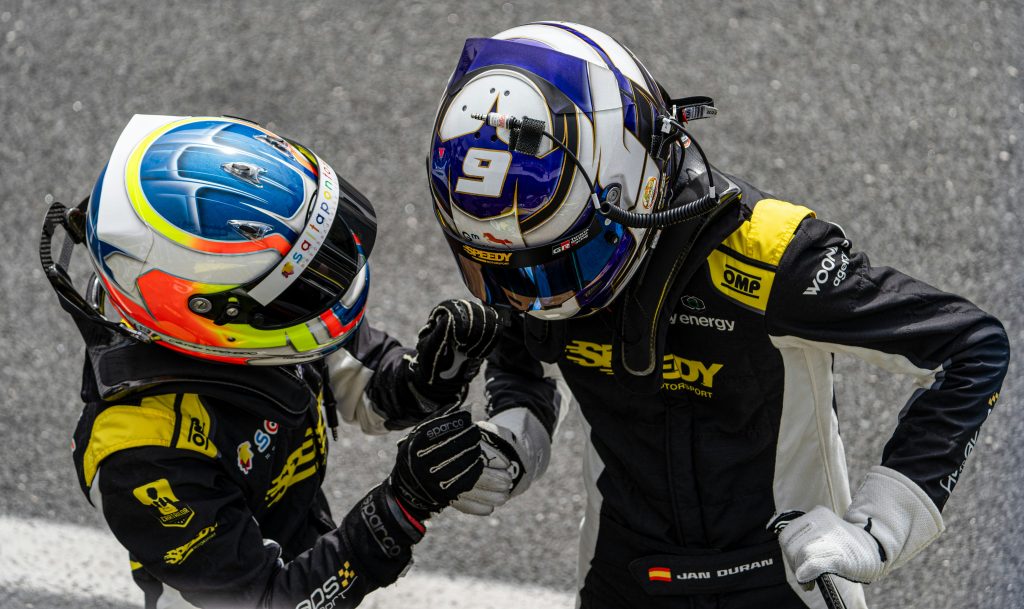Austin Dillon’s Controversial Victory at Richmond Raises Eyebrows
In a dramatic turn of events at the NASCAR Cup Series Cook Out 400 held at Richmond Raceway, Austin Dillon secured his first victory in nearly two years, but not without stirring controversy. The race, which took place on a sunny Sunday afternoon, culminated in a chaotic final lap that has left fans and fellow racers divided. Dillon, driving the iconic No. 3 car, found himself in a position to win after an aggressive maneuver that involved bumping fellow competitor Joey Logano out of the way, a move that sparked immediate backlash from several quarters.
As the race neared its conclusion, Dillon, who had been struggling throughout the season, made his move. With just a few laps remaining, he executed a bold strategy that saw him push Logano to the sidelines, allowing him to surge ahead and claim victory. While Dillon celebrated his emotional win, the aftermath revealed a brewing discontent among his peers. Denny Hamlin, another prominent driver, voiced his concerns during a recent podcast, emphasizing the need for cleaner racing and questioning the ethics of Dillon’s tactics.
The fallout from the race has led to speculation about potential penalties from NASCAR. With such a high-stakes environment and the playoff implications of Dillon’s win, officials may find themselves in a difficult position as they navigate the fine line between competitive aggression and unsportsmanlike conduct. Fans eagerly await NASCAR’s announcement regarding any disciplinary actions that may follow.
Criticism surged as the dust settled, with Logano and Hamlin among those expressing their disappointment not just in Dillon’s driving but also in NASCAR’s handling of the situation. Logano, in particular, hinted at possible retribution, stating that he would be watching Dillon closely in the upcoming races. The tension between these drivers adds an intriguing layer to the already electrifying NASCAR season.
Dillon’s controversial victory raises questions about the nature of competition in motorsports. Was his win a testament to his racing skill or a reflection of a willingness to bend the rules? The debate continues to resonate among fans, many of whom are split in their opinions. Some argue that Dillon’s aggressive approach exemplifies the spirit of racing, while others believe it undermines the integrity of the sport.
As the racing world reflects on this incident, it serves as a reminder of the intense rivalries and high emotions that characterize NASCAR. With the playoffs looming, every race becomes increasingly critical, and drivers will undoubtedly be on high alert for any aggressive moves that could jeopardize their standings.
In conclusion, Austin Dillon’s win at Richmond is more than just a personal achievement; it represents a pivotal moment in the ongoing conversation about fairness and integrity in racing. As fans and racers alike grapple with the implications of this victory, one thing is certain: the excitement and drama of NASCAR will continue to keep audiences on the edge of their seats.
Stay tuned for developments as Austin Dillon’s story unfolds in the coming races, and whether NASCAR takes any action regarding his controversial win.
Tags: Austin Dillon, Controversy, NASCAR, racing ethics, victory
Austin Dillon Claims Controversial Victory at Richmond Raceway
In a dramatic turn of events at the NASCAR Cup Series Cook Out 400 held at Richmond Raceway, Austin Dillon clinched his first win in nearly two years, but not without stirring up controversy. The race, filled with high-stakes maneuvers and fierce competition, reached a fever pitch during the final laps, leaving fans and onlookers buzzing with mixed reactions.
Dillon’s victory came after a series of aggressive moves that saw him bump and spin fellow racer Joey Logano out of contention. This last-lap fracas not only secured Dillon’s spot in victory lane but also ignited debates among the racing community about the ethics of such maneuvers in the sport. Throughout the race, Dillon appeared to be struggling to maintain a competitive pace, making his ultimate victory all the more surprising.
As the tension mounted in the final laps, Dillon’s actions drew the ire of several competitors and fans alike. Denny Hamlin, a veteran driver, took to his podcast to express his thoughts on the risky driving displayed during the race. He highlighted the potential repercussions that could arise from what many are calling a reckless finish.
In an exclusive interview following the race, Dillon acknowledged the emotional weight of his win, which he described as both a personal triumph and a contentious moment within the sport. He expressed understanding of the criticism he might face from other drivers, particularly Logano, hinting that retaliation could be on the horizon.
The aftermath of the race has left many questioning the boundaries of sportsmanship in NASCAR. While some fans celebrated Dillon’s victory, others argued that the aggressive tactics employed detracted from the integrity of the race. The diverse opinions surrounding this incident showcase the passionate nature of NASCAR fandom, where each win is scrutinized and dissected.
As Dillon savors his victory, the racing community watches closely to see if any retaliatory actions will unfold in subsequent races. The Cook Out 400 may well be remembered not just as a race where Dillon triumphed, but as a pivotal moment that could shape the narratives of driver rivalries going forward.
In conclusion, Austin Dillon’s win at Richmond Raceway is a testament to the unpredictable nature of NASCAR racing, where the thrill of victory often comes hand-in-hand with controversy. As fans gear up for the next race, the tension surrounding this incident is sure to linger, adding an extra layer of excitement to the upcoming events on the NASCAR calendar.
Tags: Austin Dillon, Controversy, NASCAR
Controversy Erupts as Austin Dillon Claims Victory in Overtime Finish at Richmond Raceway
In a dramatic turn of events at the Cook Out 400 held at Richmond Raceway, Austin Dillon clinched a controversial victory that has stirred significant backlash among fellow competitors. The race, marked by a chaotic overtime finish, saw Dillon secure his fifth career win, thereby ensuring his spot in the 2024 NASCAR playoffs. However, his aggressive driving tactics have raised questions about the enforcement of NASCAR’s rules on rough driving.
The race unfolded with Dillon in a tight battle that saw multiple lead changes and intense competition. As the final laps approached, tensions escalated, culminating in a shocking maneuver where Dillon collided with both Denny Hamlin and Joey Logano. This aggressive tactic not only secured his win but also left his rivals fuming. Hamlin expressed his confusion over NASCAR’s handling of the situation, while Logano vented his frustration, labeling Dillon’s actions as reckless and detrimental to the sport’s integrity.
The fallout from the race has sparked a broader conversation within the NASCAR community about the enforcement of rules and the balance between aggressive driving and fair competition. Critics argue that Dillon’s actions could set a dangerous precedent for future races, undermining the spirit of sportsmanship that NASCAR strives to uphold. With emotions running high, crew chiefs and drivers alike are calling for NASCAR to take a firmer stance on such incidents to maintain the sport’s credibility.
As the 2024 season progresses, the implications of this race extend beyond just the standings. The controversial finish at Richmond Raceway has reignited discussions about the importance of driver safety and the need for a clearer set of guidelines regarding rough driving. Fans and analysts alike are keenly observing how NASCAR will respond to this incident and whether it will lead to rule changes or stricter enforcement in the future.
The Cook Out 400, a pivotal event in the NASCAR Cup Series, demonstrated not only the excitement of the sport but also its vulnerabilities. As drivers prepare for upcoming races, the shadow of Richmond will loom large, influencing strategies and rivalries moving forward. This incident is a stark reminder that in the world of NASCAR, the line between victory and controversy can often be razor-thin, leaving fans eager for what lies ahead in the thrilling landscape of auto racing.
Tags: Austin Dillon, Controversy, NASCAR, Playoffs, Richmond Raceway



